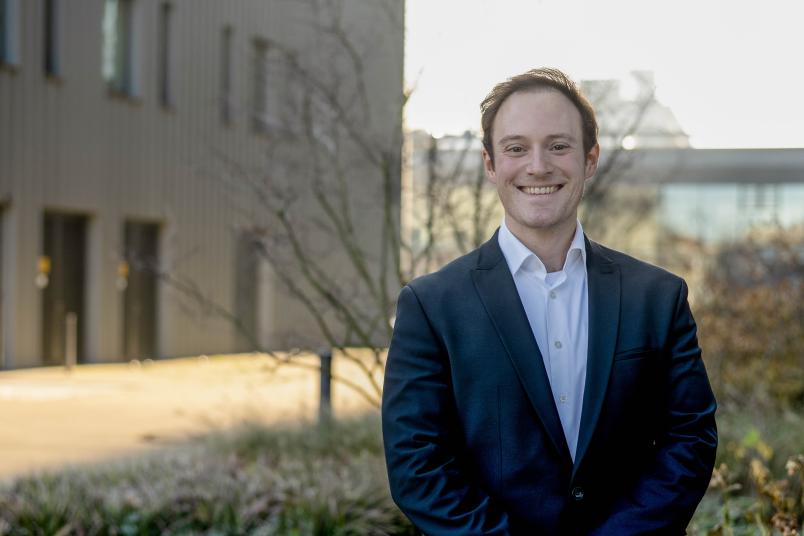
Bi-national doctorate
“It’s well worth the effort”
David Zanders completed his doctorate simultaneously in Bochum and Canada. In this interview, he reveals in what way it was a unique experience and how the exchange led him to competitive axe throwing.
It’s been just a few days since David Zanders was allowed to don a graduate cap. The chemist, affiliated to the Inorganic Materials Chemistry research group headed by Professor Anjana Devi, was awarded his doctoral degree in mid-December 2022 in Bochum. But not just there. He conducted his doctoral studies not only at Ruhr University Bochum, but also at Carleton University in Ottawa, Canada, and was extremely productive. As a freshly minted doctor of natural sciences, his list of publications already boasts 25 entries, and he completed his doctoral exam with distinction. In our interview, David Zanders reflects on how the bi-national doctorate came about, explains the benefits and shares tips for doctoral candidates who are also interested in gaining unique experiences abroad.
Mr. Zanders, what was your motivation to pursue a bi-national doctorate?
I’ve always been convinced that international cooperation, especially in the field of research, is not only important in promoting general understanding, but also yields superior results. In addition to my purely professional motivation, I also wanted to fulfil my personal dream of spending a lot of time in my host country Canada without having to fold up all my tents at Ruhr University Bochum for my doctoral thesis.
How did you benefit from it?
On a professional level, I certainly benefited from improving my language skills overall. But more importantly, I had the chance to exchange scientific ideas with colleagues from different research groups who approach subject-specific problems from different angles. This helped me a lot to develop new ideas and concepts and to put them to the test together with my colleagues at both universities. In addition to discipline-related aspects, there’s of course the intercultural component. Since I had the opportunity to spend a lot of time in Canada – not just workwise in the lab or office – I got to know the country, its people, and their complex history in depth and first hand.
Would you like to share a particularly memorable experience from your doctoral studies with us?
I experienced many wonderful and exciting moments in both research groups while working on my doctorate. If I had to choose, it would be an experience in Canada that had absolutely nothing to do with research. We had planned a group activity, and I didn’t know in advance what exactly we were going to do. It turned out that we were to compete in competitive axe throwing for an afternoon. As a leisure activity, it’s always been immensely popular there. That did come as a surprise to me, but I did quite well for a first-timer, as far as I remember.
And what have you been working on in your research?
I developed and tested novel precursors for chemical vapour deposition processes, such as atomic layer deposition. The process can be used to deposit extremely thin layers on a surface, which is very important in the semiconductor industry, for example. In order to deposit the material, the components of the film to be grown are first bound to carrier substances, i.e. the precursors, and then remain on the surface in the course of the material synthesis process.
I worked on different process steps in Ottawa and in Bochum, and the tasks were effectively divided up according to the core expertise and infrastructure of the respective research groups.
What would you recommend to students who also plan to spend time abroad and who might even consider pursuing a bi-national doctorate?
When it comes to a bi-national doctorate, early planning is key. You will have to communicate with a potential partner research group, with the graduate office at your home university and with that of the host university, as well as with the university administrations in advance. It is necessary because each doctoral programme is negotiated individually, which requires time and effort. Eventually, however, it’s well worth the endeavour, because everyone benefits from the results. For doctoral studies, for example, this can mean the (partial) waiver of tuition fees at the host university, since the candidates don’t have to attend any courses there that would have otherwise been required for the regular doctoral degree.
Another important aspect is to apply for scholarships in good time, for example at the German Academic Exchange Service (DAAD) or at institutions that support specific disciplines. It is certainly not a bad idea to check out international or bi-national funding programmes in the host country. In order to successfully apply for a study visa in the host country, it’s particularly important to provide solid proof of your financial resources.